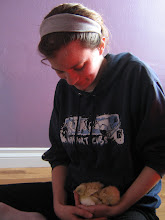One of the biggest changes that I've made recently is my understanding and approach to truth. I think that this started with my wondering about interpretation of the Bible. I realized that a lot of arguments the church has are about interpretations of this book. For example, some churches allow women to preach, and others believe this is out of the natural order of things. I think that the passage of scripture most widely referenced is a letter from Paul to the Corinthians where he forbids women from speaking in the church. From my understanding, some people believe that since it is in scripture, it is a universal truth that must be carried out today. The other side of the argument might say that this letter was written to a specific church in a day and age where women were not educated and therefore may have been spreading falsehood. Who's right?
Suddenly, I realized that I didn't know everything, and I never will. I grew up being told that the answers are in the Bible, and that's often true, but even if an issue is directly addressed, people can interpret things differently. Some interpretations are obviously self-seeking, but some seem to be equally sound in logic. In these cases, it seems clear that God is the only source of the ultimate answer. And, despite some peoples' claims, it is often very difficult to know who is speaking: God or self.
When you realize that you can't know everything about what's true, it suddenly becomes very important to decide what you can cling to as truth. For me, through my experiences, through others' experiences, and through historical records, I find it impossible to believe that there is no God. I find that I believe that Jesus did die and rise again to remove all the wrong that I've done. I do believe in God's Spirit in man. Now, I asked, what do I do as a result of this? What I came up with was that all that I was required to do was love. There are so many details involved with loving that I know that I was just vague. Truly, I think that a root question that is at the bottom of many arguments in the church is, "How DO we love?"
For me, throwing out the concern about needing to know the truth and have a position on every issue freed me. It has made me less judgmental, open to listening, and willing to think critically. I don't necessarily agree with people on everything, but I am better able to see why they think what they think. These people we disagree with are generally not as evil as we make them out to be. I think they are generally just approaching things differently but still trying to do right.
Mind you, I'm not saying it's not important to seek truth or to ask God. I think it is, and I think that if you believe something is wrong, you definitely shouldn't do it. However, I want to be open to realizing that I could be wrong in my beliefs based on incorrect interpretation or understanding, and so I shouldn't condemn others for behaving differently. I think that's why I should love people and then let God work with them like He works with me.
All in all, I think that this switch in attitude has made me more open and loving person. I also think it helps me to love more genuinely and feel less self-righteous. I'm hoping that by accepting that I might be wrong I will be better able to love and not less able to spread truth.
Broad WiMAX|今現在提供されている色々なモバイルルーターの中で…。
9 years ago
